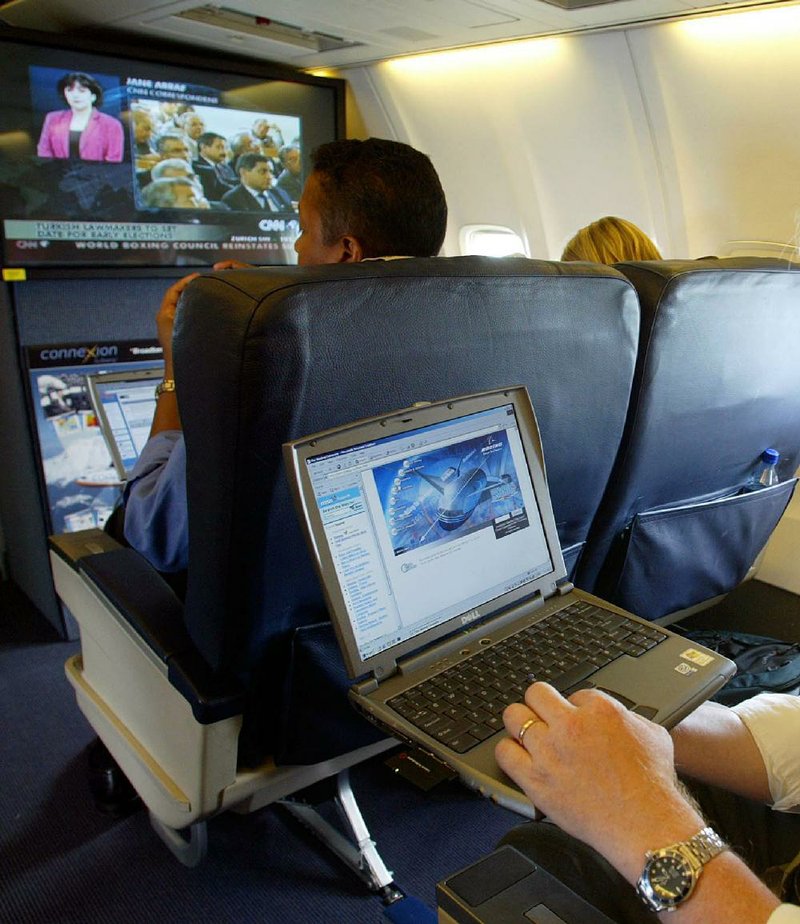WASHINGTON -- The U.S. and British governments, citing unspecified threats, are barring passengers on some international flights from mostly Middle Eastern and North African countries from taking laptops, electronic tablets, electronic games and other such devices on board in carry-on bags.
Passengers flying to the United States from 10 airports in eight countries will be allowed only cellphones and smartphones in the passenger cabins, senior officials in President Donald Trump's administration said. Larger electronic items must be checked.
The British security rules will affect flights from six countries and will bar passengers from taking "any phones, laptops or tablets larger than a normal sized mobile or smartphone" into the cabin.
The U.S. rules took effect Tuesday, and airlines will have until 2 a.m. Saturday to implement them or face being barred from flying to the United States, the officials said.
They said the decision was prompted by "evaluated intelligence" about potential threats to airplanes bound for the United States. The officials would not discuss the timing of the intelligence or whether any particular terror group is thought to be planning an attack.
Trump administration officials briefed reporters on condition that they not be identified publicly.
A spokesman for the British prime minister's office said the measures are based on the "same intelligence the U.S. relies on."
The electronics ban affects flights from international airports to the U.S. from Amman, Jordan; Kuwait City, Kuwait; Cairo; Istanbul; Jeddah and Riyadh, Saudi Arabia; Casablanca, Morocco; Doha, Qatar; and Dubai and Abu Dhabi in the United Arab Emirates. About 50 flights each day, all by foreign carriers, will be affected. The officials said no U.S.-based airlines have nonstop flights from those cities to the United States.
The British security rules will apply to flights from Turkey, Lebanon, Jordan, Egypt, Tunisia and Saudi Arabia.
Details of the electronics ban were first disclosed by the Royal Jordanian airline and the official news agency of Saudi Arabia.
In its statement, Royal Jordanian said the electronics ban would affect its flights to New York, Chicago, Detroit and Montreal.
A spokesman for Royal Jordanian said the airliner has not yet started to enforce the new U.S. regulation. Basel Kilani has said the airline was still awaiting formal instructions from the relevant U.S. departments, which could come at any time.
EgyptAir officials said the airline will implement that ban Friday, while Emirates officials said the new security procedures will start Saturday for its passengers.
Turkey's transport minister, Ahmet Arslan, criticized the ban Tuesday, telling reporters in Ankara that it was not "beneficial" for passengers and that Turkey already has stringent security measures in place, according to Turkey's semiofficial Anadolu news agency. He added that Turkish officials had spoken about the regulations with their American counterparts and were discussing whether the Trump administration should "step back."
Homeland Security Secretary John Kelly called lawmakers over the weekend to brief them on aviation security issues that have prompted the impending electronics ban, according a congressional aide briefed on the discussion. The aide was not authorized to speak publicly about the issue and spoke on condition of anonymity.
Separately, an official with the Transportation Security Administration who confirmed the new restriction said not everyone at the agency had been briefed about it as of Monday evening, raising the possibility that it was being rushed out. He noted that at a national meeting of agency security directors last week, there was no mention of intelligence that suggested that planes coming to the United States had been targeted by terrorist groups.
The TSA has been on heightened alert at several airports, said the official, who spoke on condition of anonymity because he was not authorized to discuss the issue publicly. It was not clear if the alert was related to the new restrictions on electronic devices.
The restrictions follow other changes that the TSA made in aviation security in recent days.
Two weeks ago, the TSA adopted enhanced pat-down searches for passengers at U.S. airports, a response to what the agency said were weaknesses in airport screening measures. Under the new rules, passengers will no longer be allowed to choose what type of searches they undergo in security lines.
Most major airports in the United States have a computer tomography, or CT, scanner for checked baggage, which creates a detailed picture of a bag's contents. The equipment can warn an operator of potentially dangerous material and may provide better security than the X-ray machines used to screen passengers and their carry-on bags. All checked baggage must be screened for explosives.
Information for this article was contributed by Alicia A. Caldwell, Adam Schreck, Karin Laub, Maamoun Youssef, David Koenig, Paisley Dodds, Danica Kirka, Matthew Lee, Joan Lowy and Ted Bridis of The Associated Press; by Ron Nixon of The New York Times; and by Lori Aratani, Rick Noack and staff members of The Washington Post.
A Section on 03/22/2017
